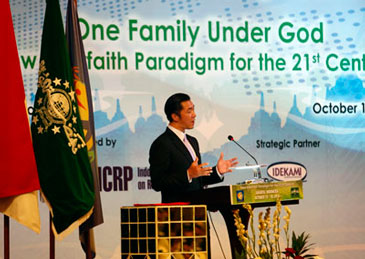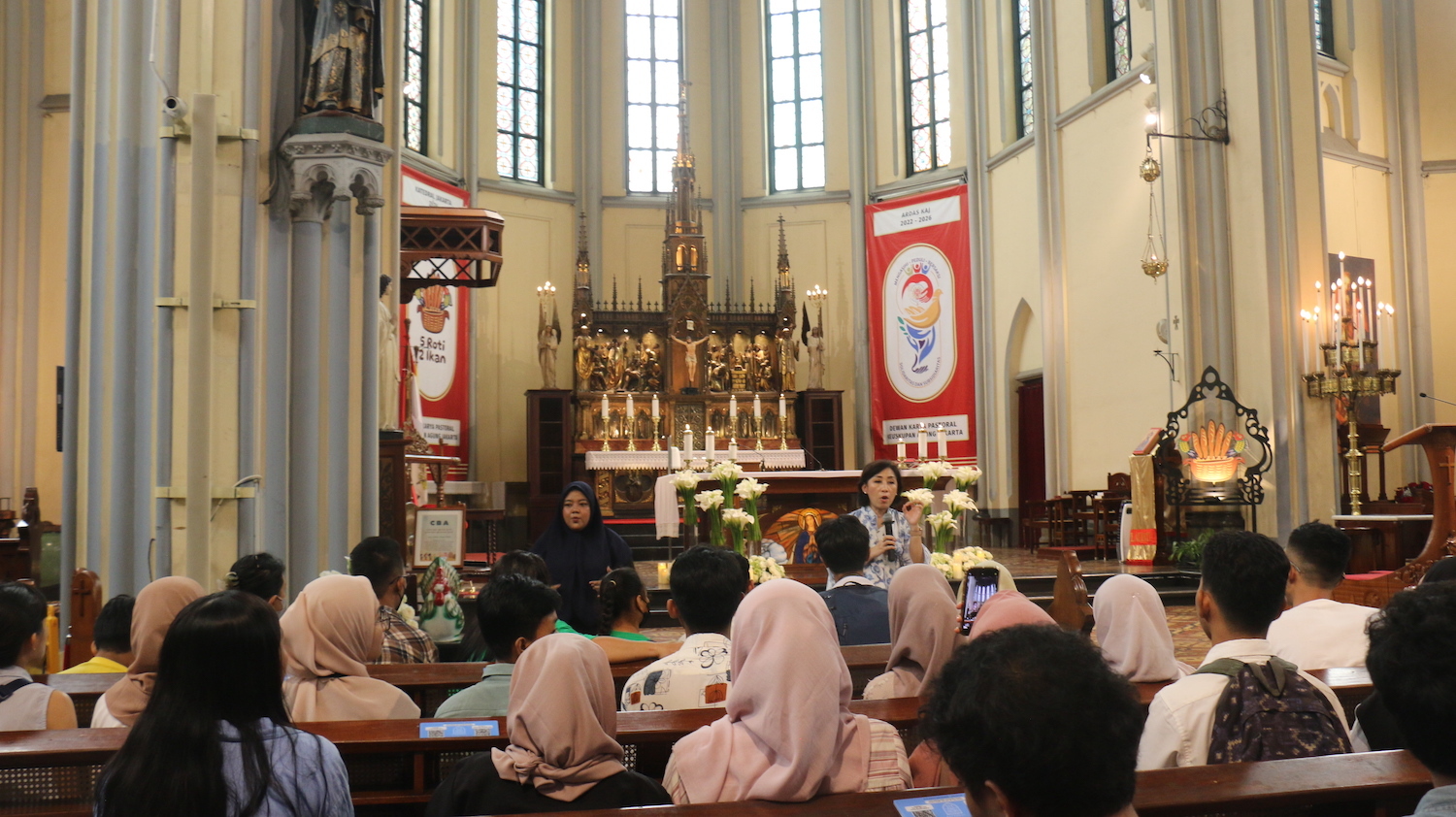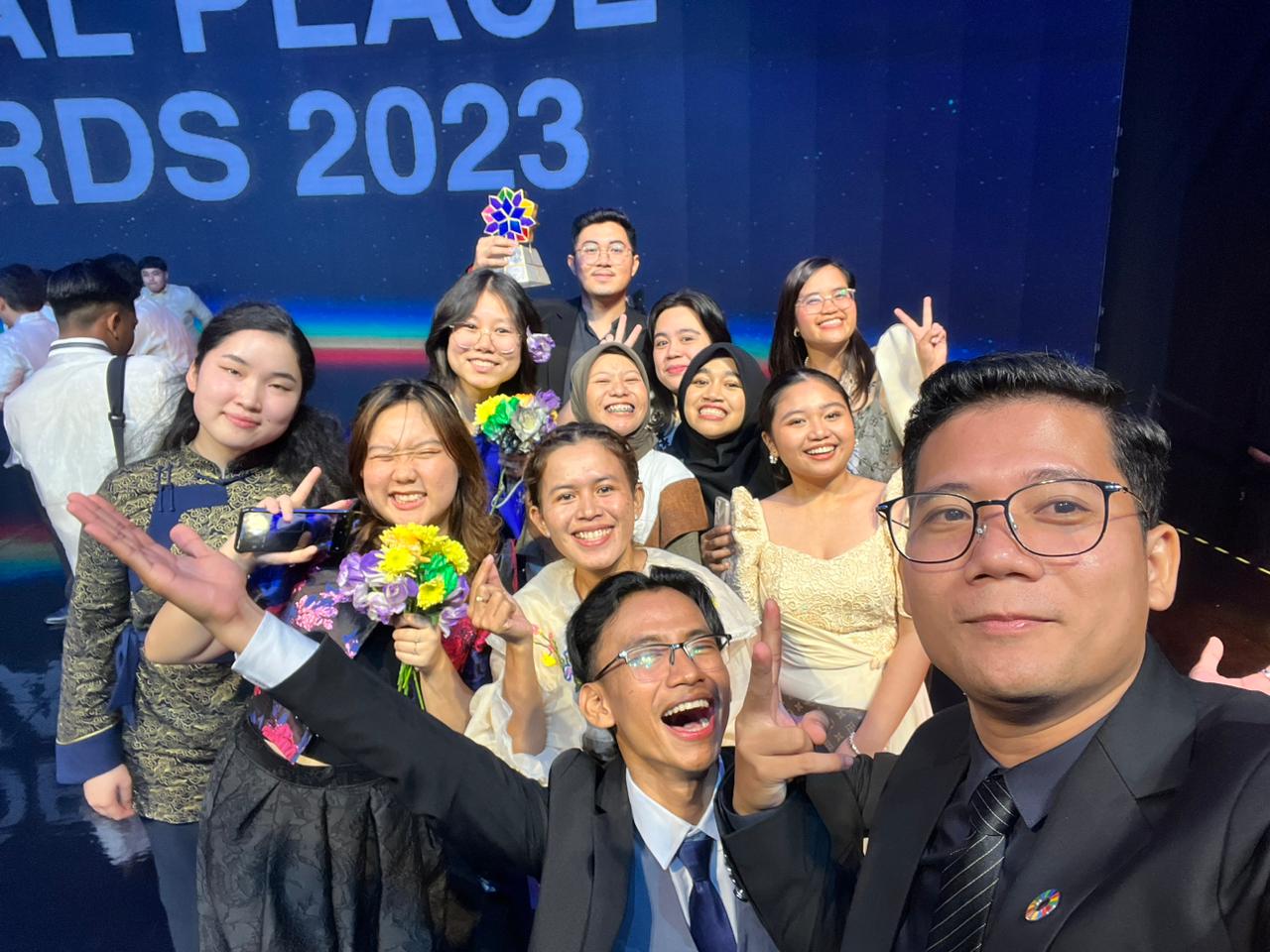October 16, 2010
Jakarta, Indonesia
Theme: “A New Interfaith Paradigm for the 21st Century”
 Dr. Hyun Jin Moon’s address to the GPLC Interfaith Summit in Jakarta, Indonesia
Dr. Hyun Jin Moon’s address to the GPLC Interfaith Summit in Jakarta, IndonesiaYour Excellency the Honorable Vice President Boediono, the Honorable Prof. Dr. Said Agiel Siradj, distinguished participants and guests, it is an honor and pleasure to meet you here at the Global Interfaith Summit in beautiful Jakarta, Indonesia. Thank you for your participation in this important conference and for your continuing dedication to the cause of peace. I especially want to recognize and appreciate our co-sponsoring organization Nahdatul Ulama (NU), without whose support this summit would not be possible, as well as the support of the Indonesian Conference for Religion and Peace.
This special summit is being convened as part of the Global Peace Festival Asia Pacific 2010, with the theme “One Family under God; a new interfaith paradigm of the 21st century.” As many of you are aware, the Asia Pacific region will play a larger role in the world as the balance of power, influence, growth, and wealth creation shifts from the Atlantic sphere to the pan-Pacific rim. At the same time, Asia represents a region of relative religious moderation and tolerance although being deeply spiritual and traditional.
The confluence of Asia’s energy and diversity with a broad-minded spirituality and socially conservative perspective gives it a unique blend of qualities where the current global challenges rooted in religious intolerance could be addressed. That is why it is especially meaningful that we convene this interfaith summit here in Indonesia, a nation that is unique in important ways. On the one hand, it is an archipelligo with some 400 ethnic groups and more than 700 languages. At the same time, it is the world’s most populous Muslim nation which, specifically, chose to embrace the broad philosophy of pancasila and the inclusive national motto of “unity in diversity.”
In January of this year, Indonesia hosted a summit with the United States where it made a commitment to cooperate on common issues through the newly created Inter-religious Council. The key areas this new agency will address is poverty reduction, climate change, good governance, and education, with an emphasis on the importance of freedom of belief and the need for faith communities to work together for the common good. It is natural that our Global Peace Interfaith Summit should build upon these previous efforts, continuing to develop those themes while adding new and important dimensions to the process.
What do I mean by moral and innovative leadership? First, it has to promote a ‘greater good’ that can benefit not only the individual but the larger society, nation and eventually the world. This is the moral orientation of the leadership I am describing.—Dr. Hyun Jin Moon
All around the globe, but particularly in the southern hemisphere, we find that many nations and regions are today, undergoing dramatic change, facing pivotal challenges, and at the same time significant opportunities. The global financial crisis which has paralyzed the developed nations of the northern hemisphere has left the southern hemisphere with its developing economies relatively unscathed. Many in these nations are questioning the established western models of development and are looking for alternative solutions, creating an opportune moment for change and leadership.
We have entered an inflection point in human history where the circumstances of this moment are preparing the world for a paradigm shift of major proportions which could positively or negatively affect this century. Being a man of faith, I cannot but feel the hand of divine providence guiding these developments in this era. Yet, at the same time, as a young man in my 40s, I feel the urgency for a new generation of global leaders to make their mark in history. I submit to you that the deciding factor at such times is always moral and innovative leadership, on every level.
What do I mean by moral and innovative leadership? First, it has to promote a “greater good” that can benefit not only the individual but the larger society, nation and eventually the world. This is the moral orientation of the leadership I am describing. For it to come to fruition it has to be guided by a vision or aspiration and a clear set of irrevocable universal principles and values that could have the breadth and depth to encompass the diversity of the human family.
Secondly, it has to harness mankind’s natural creative need to advance and develop the human condition. This is the innovative component of leadership. As you all know, every culture has examples of extraordinary men and women who propelled humanity forward in the fields of philosophy, ethics, the sciences, athletics and the cultural arts, by freely exercising their God-given talents even to the point of challenging existing paradigms. Although many faced difficulties due to religious, societal and legal constraints of their time, it is fair to say that the modern world with its greater freedoms and advancements has benefited greatly due to the sacrifices of these innovators.
Ladies and gentlemen, the modern era has seen some of the greatest scientific advances in recorded history that continue to shrink the globe with dramatic improvements in travel, communications, and the exchange of knowledge and information. Our once “global village” is fast becoming our “global home.” In the past, distance and time were the “physical impediments” which isolated and separated the human race. However, they are no longer relevant impediments. In other words, science and technology have taken away the physical barriers but have not taken away the racial, religious, national, tribal or ethnic pretensions which are still the source of ongoing conflicts around the world.
The Global Peace Foundation is leading efforts for peace based upon a spiritual vision expressed in the simple yet profound phrase, One Family under God. This vision’s transformative power comes from the fundamental truth that all people, regardless of race, religion, nationality, tribe or ethnicity, are spiritual beings who share a common heritage in one God or Creator. As Victor Hugo was to have said, “more powerful than an invading army is an idea whose time has come.” Around the world, our Global Peace Festivals have demonstrated that peoples of widely diverse backgrounds are ready to embrace this vision and commit themselves to engaging, working and living as one global family.
Centered upon the vision of “One Family under God,” GPF has developed multi-sector partnerships with its action-oriented initiatives in three key areas: 1) building interfaith partnerships, 2) strengthening families, and 3) promoting a “culture of heart” through service. In just three years, GPF has engaged more than a million people on six continents, drawing on the energy and conviction of civil society partners, the resources of the business community, the shared values of faith-based organizations, as well as the engagement of government agencies.
Our innovative approach to interfaith partnerships has brought leaders from all the great faith traditions, as well as those who do not have faith, to participate together in unprecedented ways. Unlike the interfaith of the past, which was an effort by a particular religious tradition to promote tolerance or understanding from those outside of their faith, GPF conscientiously avoids advocating any particular religious tradition but rather highlights spirituality as a basis of building a common platform of shared aspirations, principles and values. As a result, we are effectively working around the globe; from former communist bloc nations to the primarily pluralistic and capitalist Americas; from the secular, progressive European Union to the deeply religious Middle East; from tribal Africa to the diversity and energy of Asia.
We have continually seen that when people of faith collaborate in partnership for the greater good, even the most challenging social problems can be effectively addressed. Here in Indonesia, for example, GPF is partnering with NU on a global interfaith summit. In preparation for this summit, we are already collaborating on joint programs such as the Power of Rupiah project that educates youth to be socially aware of the plight of their less fortunate neighbors, regardless of class, faith, or ethnicity as well as raise resources to address poverty and other serious social problems.
Secondly, GPF affirms that the family is not only vital to the spiritual well-being of the individual, but also to building a peaceful society, nation and world. The family is the fundamental unit of society where the most essential of life skills are learned. It is the school of love, where the virtues that underlie all positive social relations are practiced and made real. Therefore, it is vital to support the traditional institutions of marriage and family, both in public policy and through practical initiatives. I am proud to report that, with the efforts of GPF and its partners, the recently adopted Kenyan constitution had overwhelming support and included provisions to protect the sacred institution of marriage as well as the sanctity of life in the womb.
Both these issues are heavily contested in the more developed western democracies but Kenya, although considered to be part of the developing world, has taken a lead on these social issues, recognizing that they have national and global consequences. I would like to point out that this era offers such opportunities for other nations, rich or poor, powerful or weak, to chart their own destinies and be leaders in key critical issues affecting the global community. But, of course to be leaders, one has to be guided by an altruistic spirit of service as well as be cognizant of the issues and their potential outcomes.
That is why GPF’s third area of focus is on creating a “culture of heart” through the cultivation of individual character and the transformative power of service. Service in this broader context entails tapping human creativity in collaborative efforts to solve problems, by making “owners” of the solution rather than merely “participants” in the process. Thus, GPF promotes social entrepreneurship and community driven development initiatives, “owned” by local partners, as important tools in addressing the most challenging human problems as well as maintaining sustainability. In addition, serving together in common cause can help to break down barriers that exist between peoples in conflict, and thus can be a powerful instrument for peace, understanding, and personal transformation.
GPF, through its subsidiary the Global Peace Service Alliance, is collaborating on cutting edge international initiatives such as “Service World.” At the same time, it initiates and supports projects that can serve as effective national and international impact models. For example, the success of the Nairobi River cleanup project in the aftermath of Kenya’s post-election violence in 2008 became the Rivers of Peace initiative that we are now taking around the world.
Inspired by that successful model, GPF in Nepal has now launched a similar project to clean the badly polluted Bagmati River in Kathmandu, considered a national symbol and, more importantly, a holy river. Thousands of volunteers gathered just a few weeks ago for the enthusiastic kickoff of the Bagmati River cleanup campaign. Already this campaign has gained significant momentum with support of youth leaders, community-based organizations, and local businesses.
Ladies and gentlemen, the role of faith is vital in establishing moral and innovative leadership, because it serves as the bedrock for society’s collective conscience and sense of virtue. All around the world, the activism of such leaders are affecting their communities on political, social and economic issues ranging from championing human rights to fighting to maintain traditional values as well as engaging the Millennium Development Goals. Faith leaders include not only clergy, ministers, priests, rabbis, imams or monks but also lay men and women who are guided by their faith.
Whether engaged in the profession of education, business, media, NGOs, politics or religion, they are motivated by faith and conscience to serve as moral and innovative leaders. Faith has always been a powerful motivating force in movements to positively transform society for the greatest good. Today, it is all the more important for people of faith to rise together, beyond our religious differences, and tackle the common challenges that are facing our communities, nations and the world.
In the past, the particularities of our religious traditions often divided us and made us competitors and rivals in the marketplace of believers. However, given the context of the global war against terror where our differences are used as a justification for violence and war, it is absolutely necessary for people of faith to come out of our narrow religious boxes and embrace a larger vision. I believe that vision should be none other than “One Family under God.”
It is important to remember that the founders of all the great religions were advocates for peace who championed the ideals of self-discipline and a selfless love for humanity. They taught and lived a life of tolerance and understanding, charity and brotherhood, righteousness and justice, and, most of all, principles and values. Their lives were a testament to the ideal that humanity is “One Family under God.” It was only after their passing that their teachings became institutionalized through rigid dogmas and traditions, thus segmenting the world under the influence of the great religious traditions as we see today.
Ladies and gentlemen, we need to go back to the fundamental teachings of those Founders -the messages of brotherhood and self-sacrifice, of love and the human family and, most importantly, obedience to the providential will of our creator, God. While we can certainly be proud of our particular religious identity, let us not have that identity blind us to our common aspirations, principles and values. For, if we look beyond the veneer of our religious differences we will see a common humanity as members of “One Family under God.”
As we deliberate here on this important occasion, I am struck with the significance of this moment when a dream can be planted that can spark the imagination of all people – to seize the reigns of our destiny and forge a new path for human history. Ladies and gentlemen, the future is yours to mold. Will we seize this moment, or will we regret the lost opportunity to make a difference? Or, will you rise with me to dream the greatest dream of all to build a world of peace and co-prosperity through the vision of “One Family under God?” The choice is ours and the moment is ours.
May God bless you in all your endeavors. Thank you very much.
***The Global Peace Festival Foundation was renamed Global Peace Foundation in November, 2012



